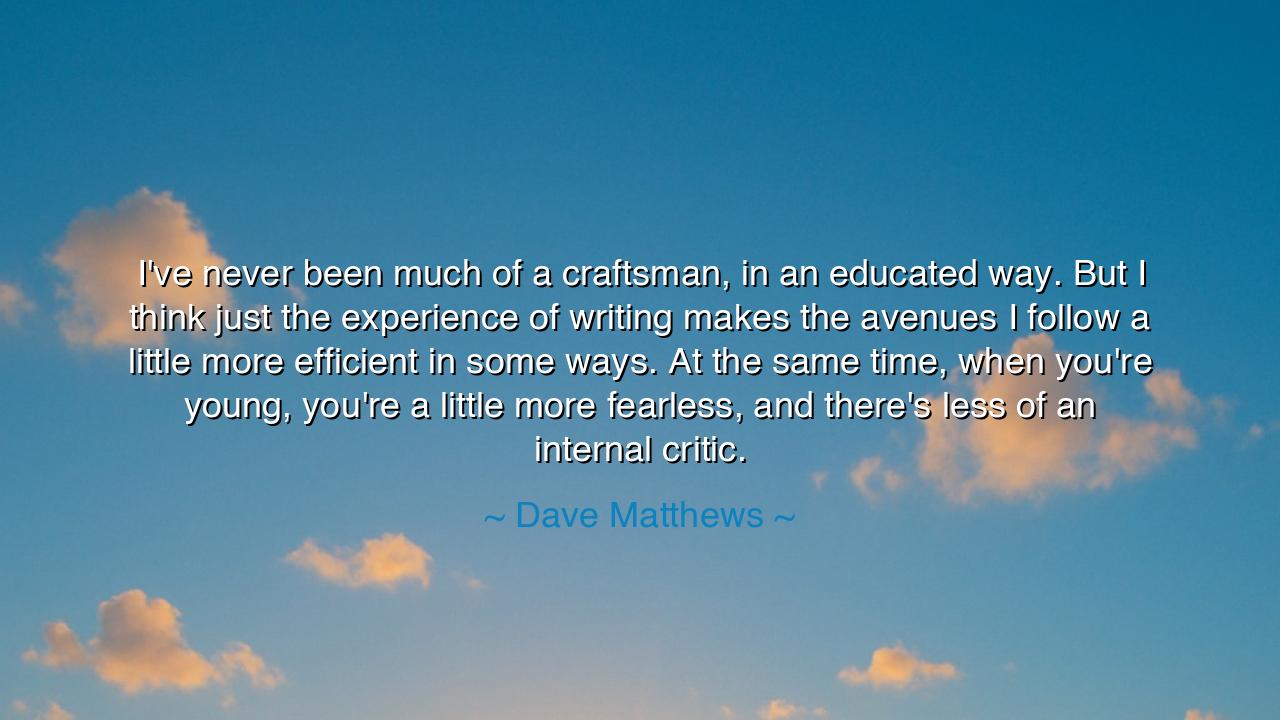
I've never been much of a craftsman, in an educated way. But I
I've never been much of a craftsman, in an educated way. But I think just the experience of writing makes the avenues I follow a little more efficient in some ways. At the same time, when you're young, you're a little more fearless, and there's less of an internal critic.






"I've never been much of a craftsman, in an educated way. But I think just the experience of writing makes the avenues I follow a little more efficient in some ways. At the same time, when you're young, you're a little more fearless, and there's less of an internal critic." — thus spoke Dave Matthews, the poet of rhythm and reflection, whose music dances between spontaneity and wisdom. In these humble words lies an eternal truth about creation, growth, and the delicate balance between discipline and fearlessness. Matthews reminds us that mastery does not always come from education or structure, but from the slow alchemy of experience — from the act of doing, over and over, until intuition sharpens into skill. Yet he also warns that as experience grows, something precious is lost: the innocent courage of youth, when one creates not for perfection, but for joy.
When Matthews says he is “not much of a craftsman in an educated way,” he speaks not in self-deprecation, but in recognition of the difference between training and truth. There are those who study the rules of their art — the scales of music, the theories of form, the techniques of structure — and there are those who step into the mystery of creation guided only by instinct. Matthews belongs to the latter kind, the natural creator, whose work flows from the well of experience rather than the map of instruction. Such creators may lack the polish of formal education, yet they carry within them something rarer: authenticity — a direct line from the heart to the world. Their art is not calculated; it breathes.
The origin of this thought lies in Matthews’ own journey as a songwriter. He never studied music in a conservatory or followed the traditions of classical training. His compositions — raw, organic, alive — emerged from long nights of experimentation, from trial and error, from listening to what the song demanded rather than what convention prescribed. Over time, his path became more efficient, as he calls it — not because he learned from books, but because he learned from life itself. Every note played, every lyric rewritten, every failure endured, became a teacher. This is the wisdom of the craftsman forged not by education, but by experience — the wisdom of one who builds by doing.
And yet, Matthews also speaks of something that fades with time: the fearlessness of youth. When one is young, the inner critic — that whisper of doubt that questions every idea — is silent or small. The young artist creates freely, like a child building castles of sand, unafraid of their collapse. But as the years pass, self-awareness grows heavier, and so does judgment. The creator becomes cautious, calculating, haunted by the need for approval. Matthews, reflecting upon this change, mourns not the ignorance of youth, but its purity of courage — the willingness to fail gloriously, to stumble, to create without apology.
This truth echoes through the stories of many great creators. Consider Leonardo da Vinci, who in his youth filled notebooks with sketches of impossible machines, wild experiments, and fantastical dreams. Much of what he imagined could not be built in his lifetime, yet it was his fearlessness that made him visionary. Later in life, though his skill grew boundless, his perfectionism — his inner critic — often kept him from finishing his work. The same man who painted the Mona Lisa left dozens of masterpieces incomplete, paralyzed by the weight of his own genius. So too does Matthews’ wisdom remind us: with experience comes refinement, but also the danger of restraint. Art must never be so careful that it ceases to be alive.
There is a deeper message here, one that transcends music and art. In every field, whether one builds, teaches, or leads, there comes a time when knowledge must be balanced with instinct. The experienced mind is efficient — it knows the pitfalls and the patterns — but the young heart is brave, willing to walk new paths without fear of failure. The wise must therefore learn from both selves: the youthful dreamer and the seasoned craftsman. To lose either is to lose wholeness. For experience gives direction, but fearlessness gives flight.
So let this be the teaching: Do not wait for mastery to begin. Begin, and mastery will come. Trust the process of creation, for every mistake refines your craft. Let experience shape you, but never let it tame you. Keep a part of your spirit young — reckless, curious, and bold — for it is that spark which keeps your art, your work, and your life truly alive. When your inner critic grows loud, remember the fearless soul who began the journey — the one who created not for approval, but for love.
And remember, O seeker of truth, the harmony of Dave Matthews’ words: that the greatest craftsman is not the one who knows every rule, but the one who feels deeply, works faithfully, and dares continually. Let your experience make you wise, but let your wonder keep you free. For between the wisdom of the old and the fearlessness of the young lies the eternal song of creation — and those who hear it, and follow it, touch something close to eternity itself.






AAdministratorAdministrator
Welcome, honored guests. Please leave a comment, we will respond soon